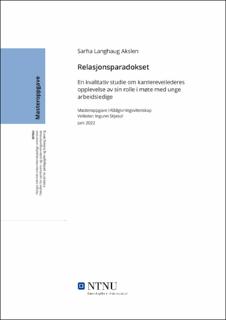| dc.description.abstract | Unge som står utenfor arbeidslivet opplever økt risiko for marginalisering og sosial ekskludering, og har sammenlignet med jevnaldrende i utdanning eller arbeid høyere risiko for blant annet psykiske lidelser, dårligere levekår og arbeidsledighet også senere i livet. Karriereveiledning kan bidra til sosial inkludering, ved å hjelpe unge som har falt fra arbeidslivet tilbake. Hensikten med denne oppgaven var å undersøke hvordan karriereveiledere opplever sin rolle i arbeidet med unge arbeidsledige, og dette har blitt gjort ut fra den følgende problemstillingen: «Hvordan opplever karriereveiledere sin rolle i møte med unge arbeidsledige?».
For å svare på problemstillingen gjennomførte jeg intervjuer med seks deltakere, som alle arbeider med å veilede unge i aldersgruppen 18-30 år tilbake til arbeid. Intervjuene omhandlet hvordan de arbeidet med å veilede unge arbeidsledige hjelpsøkere, og hvordan de opplever sin egen rolle i dette arbeidet. Ut fra disse intervjuene gjennomførte jeg en tematisk analyse, hvor jeg identifiserte tre hovedtemaer: «samarbeidspartner», «motivator» og «krevende rolle». Under «samarbeidspartner» inkluderte jeg undertemaene «medvandrer» og «å se mennesket», og for «krevende rolle» ble undertemaene «balansen mellom tilgjengelighet og avhengighet» og «å være en støtte krever at man selv har støtte». Dette gjorde jeg for å gjøre funnene tydeligere. Hovedtemaet «motivator» hadde ingen undertema.
I diskusjonen ble problemstillingen diskutert i lys av funnene fra analysen og teori. Det teoretiske grunnlaget i oppgaven er knyttet til Rogers personsentrerte rådgivning, «jeg-du»-relasjoner, relasjonsdimensjoner, agens og mestringsforventning, samt veilederes profesjonelle og personlige rolle. I tillegg inkluderte jeg noe tidligere forskning, for å aktualisere funnene og teoriene bedre. Diskusjonen ble delt inn i tre deler: «den gode relasjonen», «utfordringer ved den gode relasjonen» og «relasjonsparadokset». Denne inndelingen ble gjort fordi funnene illustrerte at i veiledningsarbeid med unge hjelpsøkere er relasjonen svært viktig, samtidig som relasjonen byr på utfordringer ved veilederrollen. Balansen mellom den gode relasjonen og utfordringen den skaper gjorde at jeg oppdaget et relasjonsparadoks, hvor veilederne både må balansere de unge hjelpsøkernes behov og ivareta sin rolle og sine behov i relasjonen. Jeg argumenterer blant annet for at unge hjelpsøkere har et behov for en god relasjon til veileder, både fordi de gjerne har dårlige relasjonserfaringer og fordi de trenger en trygg, anerkjennende relasjon for å ønske å involvere seg i veiledningen. Jeg argumenterer også for at en slik type relasjon skaper utfordringer knyttet til tilgjengelighet og avhengighet, objektivitet og den profesjonelle-personlige rollen til veiledere. Videre i del tre av diskusjonen viser jeg hvordan veilederne kan tilrettelegge for en bærende relasjon, og bygge agens hos hjelpsøker, samt skape en bevissthet rundt hvem de er i relasjonen og hvem hjelpsøker er, som måter å møte dette relasjonsparadokset på. | |
| dc.description.abstract | Young people who are outside working life experience an increased risk of marginalization and social exclusion, and have a higher risk of, among other things, mental illness, poorer living conditions and unemployment later in life compared with their peers in education or work. Career guidance can contribute to social inclusion, by helping young people who have dropped out back into working life. The purpose of this thesis was to investigate how career counsellors experience their role in working with young unemployed people, and this has been done on the basis of the following research question: “How do career counsellors experience their role in meeting young unemployed helpees?”.
To answer the research question I conducted interviews with six participants, who all work with guiding young people in the age group 18-30 years back to work. The interviews dealt with how they worked to guide young unemployed people seeking help, and how they experienced their own role in this work. Based on these interviews, I conducted a thematic analysis, in which I identified three main themes: "partner", "motivator" and "demanding role". Under «partner» I included the sub-themes «walking with the helpee» and «to see the person», and for «demanding role» the sub-themes were «the balance between accessibility and dependence» and «being a support requires that you have support». I did this to make the findings clearer. The main theme «motivator» had no sub-theme.
In the discussion the research question was discussed in the light of the findings from the analysis and theory. The theoretical basis of the thesis is related to Roger's person-centered counselling, Bubers theory about "I-thou", relationship dimensions, agency and self-efficacy, as well as the counsellors professional and personal role. In addition, I included some previous research, to better actualize the findings and theories. The discussion was divided into three parts: "the good relationship", "challenges of the good relationship" and "the relationship paradox". This division was made because the findings illustrated that in counsellor work with young helpees, the relationship is very important, at the same time as the relationship offers challenges in the role of counsellor. The balance between the good relationship and the challenges it creates made me discover a relationship paradox, where the counsellors must both balance the needs of the young helpees and take care of their own role and needs in the relationship. I argue, among other things, that young helpees have a need for a good relationship with the counsellor, both because they often have bad relationship experiences and because they need a safe, appreciative relationship to want to get involved in the counselling. I also argue that such a type of relationship creates challenges related to availability and dependence, objectivity and the professional-personal role of counsellors. Furthermore, in part three of the discussion, I show how the counsellors can facilitate a supportive relationship, and help build agency within the helpees, as well as create an awareness of who they are in the relationship and who the helpee is, as ways to meet the relationship paradox. | |
